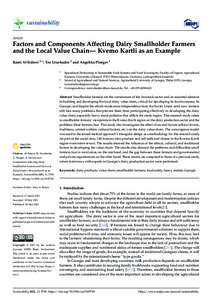| dc.date.accessioned | 2021-06-30T09:43:27Z | |
| dc.date.available | 2021-06-30T09:43:27Z | |
| dc.date.issued | 2021-05-20 | |
| dc.identifier | doi:10.17170/kobra-202106244159 | |
| dc.identifier.uri | http://hdl.handle.net/123456789/12952 | |
| dc.description.sponsorship | Gefördert durch den Publikationsfonds der Universität Kassel | ger |
| dc.language.iso | eng | eng |
| dc.rights | Namensnennung 4.0 International | * |
| dc.rights.uri | http://creativecommons.org/licenses/by/4.0/ | * |
| dc.subject | dairy products | eng |
| dc.subject | value chain | eng |
| dc.subject | smallholder farmers | eng |
| dc.subject | food safety | eng |
| dc.subject | heavy metals | eng |
| dc.subject | Georgien | eng |
| dc.subject.ddc | 630 | |
| dc.title | Factors and Components Affecting Dairy Smallholder Farmers and the Local Value Chain— Kvemo Kartli as an Example | eng |
| dc.type | Aufsatz | |
| dcterms.abstract | Smallholder farmers are the cornerstone of the livestock sector and an essential element in building and developing the local dairy value chain, critical for developing its local economy. In Georgia, and despite the efforts made since independence from the Soviet Union until now, farmers still face many problems that prevent them from participating effectively in developing the dairy value chain, especially heavy metal pollution that afflicts the study region. This research study refers to smallholder farmers’ viewpoints in the Kvemo Kartli region on the dairy production sector and the problems these farmers face. This study also investigates the effect of several factors (ethical factors, traditions, animal welfare, cultural factors, etc.) on the dairy value chain. The convergence model was used in the mixed-method approach’s triangular design as a methodology for this research study. As part of the social data, 140 farmers who produce and sell milk and cheese in the Kvemo Kartli region were interviewed. The results showed the influence of the ethical, cultural, and traditional factors in developing the value chain. The results also showed the problems and difficulties small farmers face in rural areas, on the one hand, and the gap between these farmers and governmental and private organisations on the other hand. These results are compared to those of a previous study, where interviews with experts in Georgia’s dairy production sector were performed. | eng |
| dcterms.accessRights | open access | |
| dcterms.creator | Al Sidawi, Rami | |
| dcterms.creator | Urushadze, Teo | |
| dcterms.creator | Ploeger, Angelika | |
| dc.relation.doi | doi:10.3390/su13105749 | |
| dc.subject.swd | Milchprodukt | ger |
| dc.subject.swd | Wertschöpfungskette | ger |
| dc.subject.swd | Kleinbauer | ger |
| dc.subject.swd | Ernährungssicherung | ger |
| dc.subject.swd | Produktsicherheit | ger |
| dc.subject.swd | Schwermetall | ger |
| dc.subject.swd | Georgien | ger |
| dc.type.version | publishedVersion | |
| dcterms.source.identifier | eissn:2071-1050 | |
| dcterms.source.issue | Issue 10 | |
| dcterms.source.journal | Sustainability | eng |
| dcterms.source.volume | Volume 13 | |
| kup.iskup | false | |
| dcterms.source.articlenumber | 5749 | |


